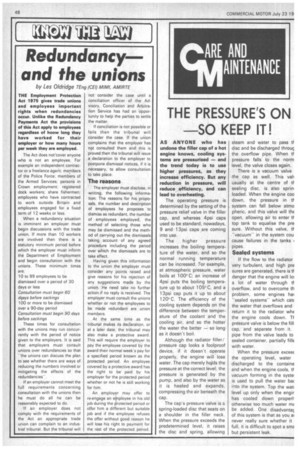Redundancy and the unions
Page 78

If you've noticed an error in this article please click here to report it so we can fix it.
by Les Oldridge TEng (CEI) MIMI, AMIRTE
THE Employment Protection Act 1975 gives trade unions and employees important rights when redundancies occur. Unlike the Redundancy Payments Act the provisions of this Act apply to employees regardless of hoow long they have worked for their employer or how many hours per week they are employed.
The Act does not'cover anyone who is not an employee. For example an independent contractor or a freelance agent; members of the Police Force; members of the Armed Services; persons in Crown employment; registered dock workers: share fishermen; employees who have contracted to work outside Britain and employees engaged for a fixed term of 12 weeks or less_ When a redundancy situation is imminent an employer must begin discussions with the trade union. If more than 10 workers are involved then there is a statutory minimum period before which the employer must inform the Department of Employment and begin consultation with the unions. These minimum times are: 10 to 99 employees to be dismissed over a period of 30 days or less Consultation must begin 60 dgays before sackings
100 or more to be dismissed over a 90-day period
Consultation must begin 90 days before sackings
These times for consultation with the unions may run concurrently with the period of notice given to the employers. It is said that employers must consult unions over redundancies so that -the unions can discuss the plan to see whether there are ways of reducing the numbers involved or mitigating the effects of the redundancies...
If an employer cannot meet the full requirements concerning consultation with the unions then he must do all he can be reasonably expected to do.
If an employer does not comply with the requirements of the Act an appropriate trade union can complain to an industrial tribunal. But the tribunal will not consider the case until a conciliation officer of the Advisory, Conciliation and Arbitration Service has had an opportunity to help the parties to settle the matter.
If conciliation is not possible or fails then the tribunal will consider the case. If the union complains that the employer has not consulted them and this is proved then the tribunal will issue a declaration to the employer to postpone dismissal notices, if it is necessary, to allow consultation to take place.
The reasons The employer must disclose. in writing, the following information: The reasons for his proposals, the number and description of employees he proposes to dismiss as redundant, the number of employees employed, the method of selecting those who may be dismissed and the method of carrying out the dismissals taking account of any agreed procedure including the period over which the dismissals are to take effect.
Having given this information to the union the employer must consider any points raised and give reasons for his rejection of any suggestions made by the union. He need take no further action if no reply is received. The employer must consult the unions whether or not the employees to be made redundant are union members.
At the same time as the tribunal makes its declaration, or at a later date, the tribunal may also make a protective award. This will require the employer to pay the employee covered by the award their normal week's pay for a specified period known as the protected period. An employee covered by a protective award has the right to be' paid by his employer for the protected period whether or not he is still working for him.
An employer may offer to re-engage an employee in his old job during the protected period or offer him a different but suitable job and if the employee refuses the offer without good reason he will lose his right to payment for the rest of the protected period_
















































































































